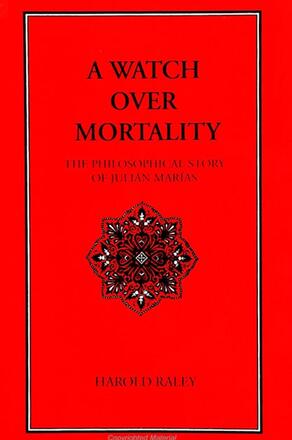
A Watch Over Mortality
The Philosophical Story of Julian Marias
Alternative formats available from:
An in-depth study of the thought of contemporary Spanish philosopher Julian Marias, in the context of Ortega y Gasset and his times and twentieth-century Spanish culture.
Description
In A Watch Over Mortality Harold Raley offers the English-speaking world Julián Marías's compelling alternatives to contemporary minimalist thought, and does so in a dynamic style that itself reflects the humane spirit and verve of what may well prove to be the most innovative philosophy of modern times. Here for the first time Marías's philosophy is revealed in its full historical depth, its many interrelated levels, its fascinating aperçus, and its real or possible applicability to many humanistic disciplines.
In order to do justice to Marías and his way of thinking, Raley narrates the evolution of this philosophy from early antecedents in Germanic and Ortegan phenomenology to Marías's own original contributions. For this reason A Watch Over Mortality is not only a book about Marías but also about Ortega y Gasset and his times, about twentieth-century Spanish culture, and, ultimately, about the nature of Spain itself. The book is itself an exercise in the very method and style of the philosophy it explicates.
Harold Raley is Professor of Languages, Robert H. Ray Chair of Humanities, and Dean, College of Arts and Humanities, at Houston Baptist University. He is the author of Jose Ortega y Gasset: Philosopher of European Unity; and Responsible Vision: The Philosophy of Julian Marias and coauthor of Jose Ortega y Gasset: A Bibliography of Secondary Sources. In addition, he has published several books in Spain and translated four books by Julian Marias.
Reviews
"Well written and well thought out, this book brings us up to date on Marías by including the latest (and concluding) items in his substantial corpus of works. Author Harold Raley does for Marías what Marías tried to do for Ortega y Gasset, except that he does it better. He explicates, clarifies, justifies, and defines Marías's thought as a whole in the context of his life and his long-term relation to Ortega. His grasp of the issues is confident and convincing; his style is lucid and readable." —John T. Graham, University of Missouri, Kansas City
"What I like most about this book is its lucidity, comprehensives, sympathy, and up-to-dateness. The problem-set dealt with Marias and the particular applications thereof, which are well presented and developed in context by the author, are right at the center of contemporary thought: rationalism vs. irrationalism, phenomenology and existentialism, feminism, etc. It identifies possible or alternative ways of examining and resolving these questions by faithful descriptive analysis and radicalization. The book has a novel-like quality which permits the author to write with style and achieve moments of depth and nonsuperfluous elegance." -- Jorge Garcia-Gomez, Long Island University
"Marias continues a tradition in philosophy that is little known yet vital for English-speaking philosophers to know about. This book is a splendid continuation of the tradition I consider so important." -- Howard N. Tuttle, University of New Mexico